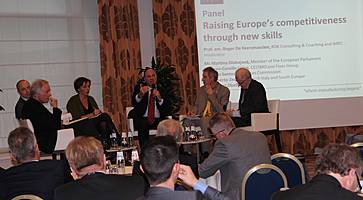CECIMO General Assembly Strategic Discussions: the pace of technological advances widens the skills gap in the machine tool industry

During its General Assembly in Brussels, CECIMO organized a panel on the theme “Raising Europe’s competitiveness through new skills” attended by speakers from the European Institutions and industry representatives. The panel gave rise to vivid debates as regards the impact of new technologies on the manufacturing workforce. CECIMO industrialists underlined that work-based learning plays an instrumental role in strengthening the skills pipeline of the European machine tool industry.
New technologies, new skills
While disruptive technologies provide new business opportunities for machine tool builders, understanding the scope of technological changes occurring on different fronts and integrating them into their own business is a complex task and requires new skills. Technological advances made by actors beyond the machine tool industry often leave education providers in the sector with limited chances to catch up with disruptive innovations and widens the gap between the talent needed by machine tool companies to innovate and the talent they can actually find. For instance, additive technologies allow manufacturers to produce complex shapes and structures on-demand and to save significant amounts of resources by improving time-to-market. Nevertheless, the knowledge and the equipment needed to equip the workforce with relevant practical skills are not commonly available at education providers, hampering the skills supply of the sector vis-à-vis emerging technologies.
Vocational education is the key to bring education and industry closer
During the CECIMO panel, Ms Martina Dlabajová, Member of the European Parliament, highlighted that, in the era of rapid technological change, learning programmes need to be designed with the involvement of business actors to supply the industry with the skills actually needed. In this regard, vocational education underpinned by apprenticeship programmes generate outstanding opportunities by providing schools and learners with the latest innovations from the industry and by developing new channels for companies to influence the curriculum delivered at education providers.

The panelists, from left: Jean-Camille Uring, Board Member of CECIMO and Fives Group, Roberto Zecchino, Vice-President Human Resources and Organization at Bosch Italy and South Europe, Martina Dlabajova, Member of the European Parliament, Joao Santos, Acting Head of Unit at DG Employment, Laurent Zibell, Policy Advisor at IndustryAll and Roger de Keersmaecker from IMEC and RDK Consulting and Coaching.
Matching the needs of SMEs by sector-wide initiatives
Mr Jean-Camille Uring, Board Member of CECIMO and Fives, highlighted that while large manufacturing companies possess the knowledge, capacity and resources to deliver their own up-to-date training programmes, SMEs of the machine tool industry are hit by the increasing complexity and costs of training programmes, threatening their competitiveness and sustainability. It is therefore essential to pool public and private resources to develop joint and sector-wide training tools and platforms for SMEs. To this end, CECIMO with its national associations and education partners have launched a Sector Skills Alliance, METALS, funded by the EU, aiming at improving the vocational education in the sector by contributing to development of new joint-curricula aligned with emerging technologies such as additive manufacturing.
Forecasts state that the global machine tool consumption will grow from 60 to over 70 billion EUR in the next five years and the metal-based additive manufacturing will quadruple by 2022. Owing to the integration of IT, electronics and mechanics, many machine tool building processes are digitized. The competences allowing to aggregate information between different areas such as planning, design, programming and production are key for the competitiveness of the sector. The European Commission recognizes the advanced manufacturing industry as a sector with skills imbalances.
